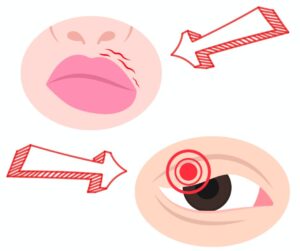What is Synkinesis?
Synkinesis (pronounced sink-eye-nee-sis) means the development of linked or unwanted facial movements.
It is common and occurs in the majority of people who are recovering from prolonged facial palsy.

What does synkinesis look and feel like?
-
- Only the affected side of the face develops synkinesis.
- The areas that are normally most affected are the eye, cheek, chin and neck.
- Synkinesis may show itself in various ways.
The following are some examples of how Synkinesis looks and feels.
Remember, Synkinesis occurs on the affected side and can be more clearly observed when compared to the unaffected side:
- You may notice your eye narrows when you smile.
- Your cheek lifts when you close your eyes.
- You may notice your neck muscle tightens when you try to whistle.
- Facial twitching, especially in the cheek and sometimes the chin.
- Facial muscles, including those across your brow, may become tight, causing facial pain and occasionally headaches.
- Some people find that when they eat their eye water or their nose streams.
- Commonly, when relaxed, the affected side of the face may have a deeper cheek crease, the cheek may appear bulky, the eye narrow or the mouth pulled up.
- Muscles are mistakenly thought of as weak when actually they are tight or stiff and find it difficult to move.
What can you do to improve your synkinesis?
- Be assessed by a Chartered Physiotherapist who has specialist knowledge in facial rehabilitation.
- Your Physiotherapist will teach you what synkinesis is and why it happens.
- You will also learn to identify which muscles normally work during movements and therefore which additional muscles are working during your synkinetic movement.
- Avoid going to other sources for help as synkinesis can be made worse if exercises are carried out incorrectly.
- You will require a bespoke home exercise programme which will meet your individual needs.
Remember
If you are interested in booking an appointment with our Specialised Facial Palsy Chartered Physiotherapist or simply need some guidance, then please give us a call on 021 4633455 or book online below.
We hope you enjoyed this blog by Emer Maher, Specialist Facial Palsy Chartered Physiotherapist.
This blog is provided for information purposes only. The content is not intended to be a substitute for professional medical advice, diagnosis or treatment. Seek the advice of your doctor with any queries regarding a medical condition.
